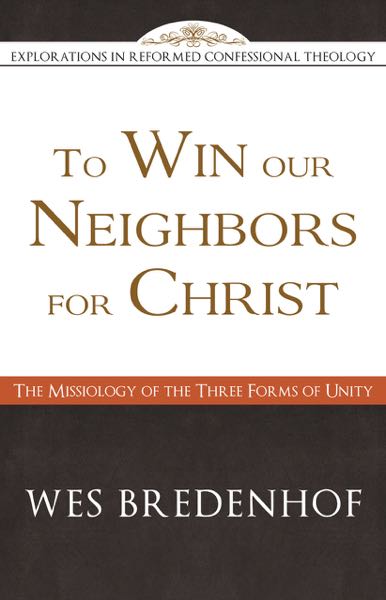
Wes Bredenhof
Reviewed by: Jack W. Sawyer
To Win Our Neighbors for Christ, edited by Wes Bredenhof. Reformation Heritage Books, 2015. Paperback, 95 pages, list price $10.00. Reviewed by OP pastor Jack W. Sawyer.
To Win Our Neighbors to Christ is a compact, but compelling apologia for the missionary implications of the Three Forms of Unity. It is a volume in the series Explorations in Reformed Confessional Theology. Written by Canadian Reformed pastor Wes Bredenhof, the book rebuts the often heard claim that the Reformation and the confessional documents it produced have little or nothing to say about missions. Bredenhof helps Reformed believers to understand that their confessions compel them to care about a world lost in unbelief, and he shows how this confessional heritage leads to missionary activity.
In his preface, Bredenhof defines the mission of the church as “the official sending of the church to go and make disciples by preaching and witnessing to the good news of Jesus Christ by the power of the Holy Spirit.” He sees no point in a strict distinction between mission and evangelism. In his view, “The mission of the church is evangelism.” Arguably this definition is too narrow, for the Great Commission clearly has an educative dimension. But no doubt the author would acknowledge this, and he does in fact imply it throughout his brief work.
Since Calvinistic doctrine is sometimes twisted to discourage evangelism and missions, it is refreshing to find in this book an enthusiastic, cogent pushback against such views. Similarly, since the OPC rejected the chapter on “the Love of God and Missions” added to the Westminster Confession by the PCUSA in 1903, I found that Bredenhof provides a helpful impetus for reading our own Westminster Standards in a missional light. (Parenthetically, it is gratifying to note that the OPC has always been unequivocally committed to missions.)
Explaining each of the relevant parts of the Three Forms of Unity and their historical context, the author shows that as the Reformed believer shares union with Christ, he is compelled to look with care and compassion upon the lost around him, near and far. Also helpful is the care the author has taken to consult active home and foreign missionaries, and he has throughout included their accounts of how they integrate the Reformed confessions into their work on the field. The consistent method of the book is nowhere better exemplified than on page 50, where Question 86 of the Heidelberg Catechism is cited, explained, and applied. This question has to do with the believer’s sanctified service and good works. The catechism places in the mouth of the Reformed believer the statement that he does good, “so that by our godly walk of life we may win our neighbors for Christ.”
From there comes the title of a book that this reviewer is pleased to commend. It should prove to be a helpful tool for both individual and group study.
December 28, 2025
December 21, 2025
December 14, 2025
December 07, 2025
November 30, 2025
November 23, 2025
November 16, 2025
© 2026 The Orthodox Presbyterian Church